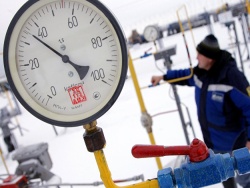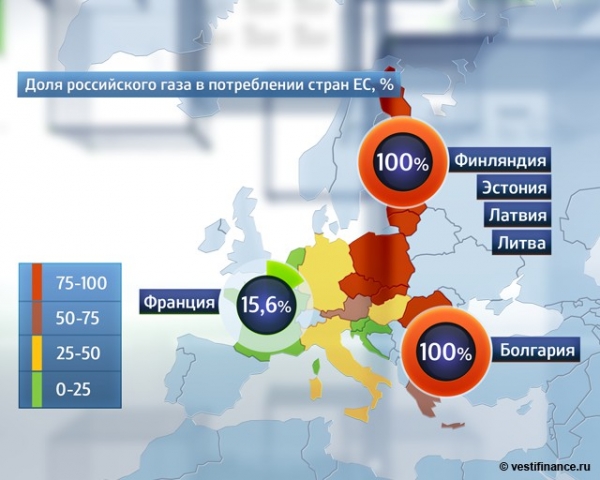
If all goes as expected in supporting the project people, the new pipeline to start the construction of which was recently announced, will run through half a dozen countries. It will provide increased supplies of natural gas to Europe, as well as reduce disturbing the continent’s dependence on Russia — its critical supplier.
However, many observers question: whether the pipeline to withstand all anticipated load — physical, economic and geopolitical?
This 860-km TRANS Adriatic pipeline (TAP) worth $ 5 billion is planned to be operational in 2020 it will pass through Italy, Greece and Albania, and will also be attached to the pipeline, going from Turkey to Armenia and Azerbaijan, and thus will be laid the southern route bypassing Russia. The new pipeline is a joint project of the gas companies from Britain, Azerbaijan, Spain, Switzerland and Italy.
He will have to provide natural gas to 7 million households in South-Eastern Europe. In addition, the possibility of its accession to the network of pipelines serving Western Europe.
TRANS Adriatic pipeline is one of 195 in work projects aimed at diversification and expansion of energy supply in the European Union, as well as the development of appropriate infrastructure.
“(The goal of this project is improving Europe’s energy security and diversification of energy supplies, but in addition, we are talking about access to the pipeline network of certain countries and regions that were previously at a disadvantage in terms of access to energy, — said Harry-Zachary Timiras (Harry-Zachary Tzimitras, Director situated in Cyprus Research Institute of peace (Peace Research Institute). — This project is also important for Greece. Greece will have the opportunity in the future to become an important Central hub in the system of transportation of energy”.
Russia for decades continues to be for Europe the main supplier of fossil fuels. European Union officials are struggling to reduce the existing dependence after the incident ten years ago the conflict between Russia and Ukraine, which from time to time there is the threat of termination of gas supplies to the rest of Europe.
“A turning point, a kind of Pandora’s box in regard to concerns with regard to the great dependence of the European Union from energy supplies from Russia, served as the incident ten years ago the Ukrainian crisis and the ensuing first case of termination of deliveries of Russian natural gas to Europe, — said the Center Karakasis (Vasileios P. Karakasis), an expert in the field of international relations at the University of Leiden in the Netherlands. — To resolve this issue, many member countries of the European Union tried to find a solution that would allow us to diversify energy supplies to Europe.”
The Russian President reportedly does not feel great joy about new pipeline construction. As expected, the energy issues will be among the main items on its agenda during a visit to Greece this week. Moscow planned to build its own pipeline through Turkey or Bulgaria and then in the direction of Greece and Italy, but then these plans were postponed as a result of tension in relations with Turkey because of the events in Syria. Meanwhile, the European Union blocked the Bulgarian part of the project.
According to the Greek press, Athens during his visit, Mr. Putin will not be focused on the proposed Russian pipeline project “Poseidon” because of the uncertainty in regional geopolitics.
The visit of Mr. Putin to Greece will be the first visit of the Russian President one of the member countries of the European Union after a visit to Italy, held about a year ago.
Some observers believe that Adriatic pipeline does not have to cause irritation in Moscow. Russia will continue to supply natural gas to Europe through Germany, which declares that it is satisfied that the Russian supply route.
TRANS Adriatic pipeline can cover only a small fraction of total European demand in natural gas and Russia’s Gazprom, as expected, it will still be able to offer competitive prices in comparison with the new pipeline, analysts say.
“It is important to consider it not in an antagonistic way, but rather as an additional route that needs to diversify energy supplies,” said Mr. Tsimaras.
Other observers believe that the new pipeline is not able to provide the degree of energy independence, which is calculated by its supporters.
“Whether the project itself is to help Brussels to reduce the leverage of Russia on the European Union? The answer is definite: no. In the near future such a scenario is not realistic,” — said Mr. Karakasis. — Estimated volume of natural gas that will be sent from Azerbaijan to Europe, you can’t even compare with the amount of this natural raw material which is sourced from Russia.”
Gift for Greece
However, the new pipeline is a boon for Greece, which is struggling to recover from massive financial and economic collapse that occurred during the great Recession. As expected, the new project will allow to create 8 thousand jobs in a country where the unemployment rate is two times higher than the average in the European Union, and is 24%”.
“The construction of the TRANS Adriatic pipeline begins at a very important moment for the Greek economy and for the broader region,” said Prime Minister Alexis Tsipras, speaking this month at a ceremony in the city of Thessaloniki, marking the start of construction of a new pipeline. It was also attended by officials from other countries in the region.
“As for the economy of Greece, today’s ceremony coincides with the successful completion of the first assessment (report to creditors about the state of the Greek economy), but also with the process of quick recovery and early growth for Greece”, he stressed.
However, some regions in Greece and Italy ask the question about the impact of the new pipeline on their homes and sources of income. “There is no doubt that the TRANS-Adriatic pipeline will change the economies of the regions through which it will pass,” said Spyros Sofos (Sofos Spyros), Professor at the Centre for the study of the Middle East of Lund University in Sweden. And I’m not just talking about the possible creation of 8 thousand jobs, but also about the use of land. It’s not just about the land through which the pipeline; there must be built entrances, ensuring safety and access. This is a significant site, which no longer will be cultivated”.
According to published in the 2014 report of Geotechnical chamber of Greece, providing consulting services to the government, this pipeline should be moved further North in order not to destroy the fertile agricultural land, whereas the compressor station to be built in the vicinity of Serres in Greece, should place the further for security reasons. “Agricultural land and farmers are important components of the development of the country,” he said.
Firm TAP AG, the leading construction of the TRANS Adriatic pipeline is the property of BP, Azeri energy company SOCAR, the Italian Snam, Belgian Fluxys, Enagas Spanish and Swiss Axpo. According to representatives of TAP AG, had taken all precautions to ensure the safety of the local population. In addition, TAP AG is going to spend millions of dollars on the holding companies in this region about corporate social responsibility.
One Italian movement opposing the construction of a new pipeline, casts doubt on energy planning European Union, as well as cooperation with authoritarian regime of Azerbaijan, who is accused of arrest of journalists who speak out against the government. “We ask the European Commission to test the procedure, by definition, the so-called “projects of common interest”, which currently excludes from the decision-making process those who must get the major profits from the projects,” said Marco Poti (Marco Poti, mayor of melendugno, in an open letter sent to the leaders of the European Union. His city is the entry point of the pipeline on the territory of Italy, and the mayor has declared that will fight against this project.
Some observers believe that this project will allow to transport American and Israeli liquefied natural gas through located in the sea of the complex (near the city of Alexandroupolis, in Northern Greece), which will be linked to the TRANS-Adriatic pipeline.
The United States is not the country which will host the pipeline, said Secretary of state John Kerry in his statement, “however, (we supported him) because he gives people new hope and opportunity for stability and prosperity in all countries along the route of its passage, and also in the neighboring regions”.







